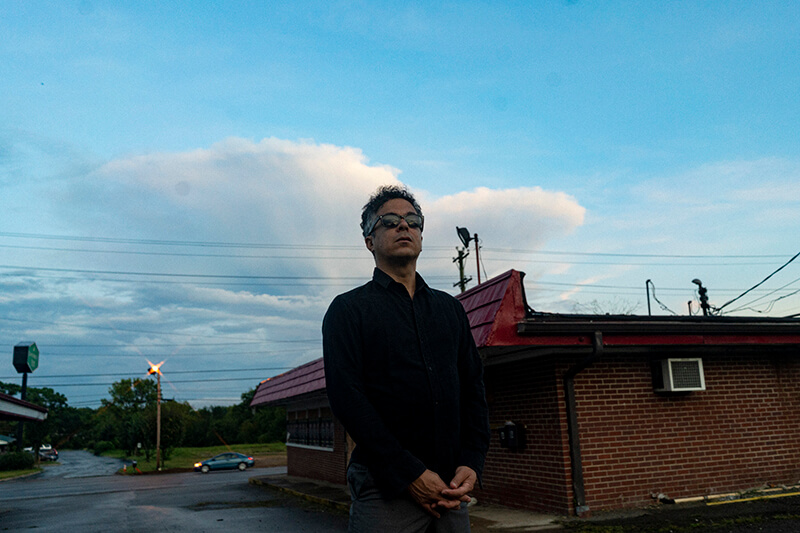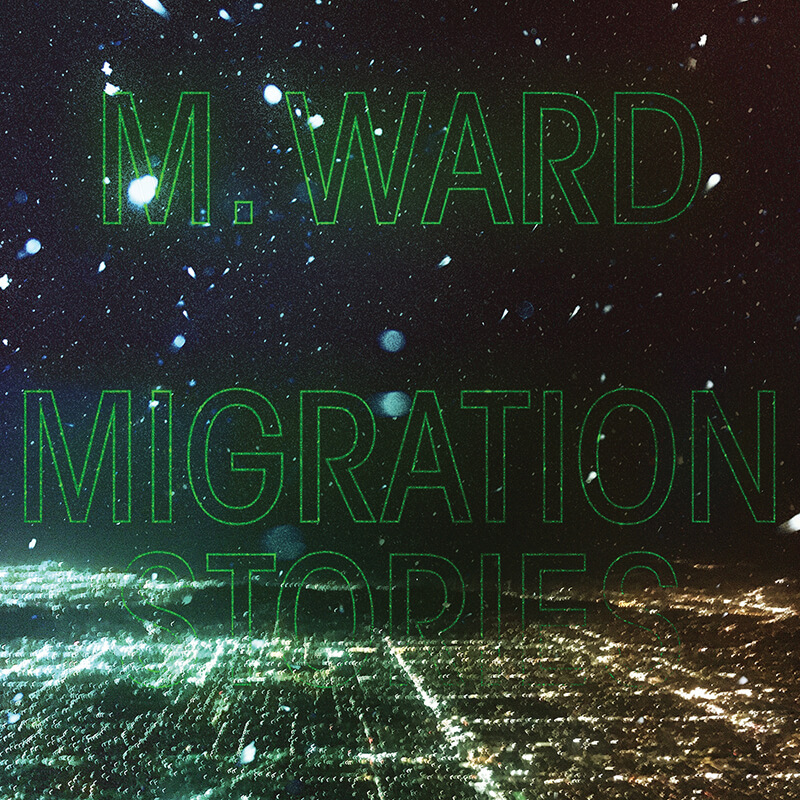One hundred years ago M. Ward’s grandfather crossed into the United States from Mexico at the border near El Paso. In April, the singer-songwriter will release his tenth album, Migration Stories, a hazy collection of dream-like narratives with their origins in pictures from newspapers and television reports, stories told by friends and even some, like the aforementioned one, from Ward’s own family history.
From the opening lines of the Migration Stories’ title track, Ward casts a simple, consoling message of a journeyman: “Sailing on past space and time; that’s how I’ll get back to you.” This endearing sentiment becomes the spine of this musical travelogue. As the album unfolds, Ward weaves together a collection of narratives that are simultaneously a contemporary look on life in the Wild West that is 2020, but also as timeless as the fabled lonesome cowboy in the peaceful desert.
In contrast to the Rust Belt imagery of the album’s stories, Ward travelled to Montreal in winter to tap into the abundance of talent north of the border. In late 2018 and early 2019 Ward assembled a team and began to record with Canadian indie royalty: Tim Kingsbury and Richard Reed Parry, alongside Craig Silvey and Teddy Impakt at Le Studio Du Arcade Fire.
“I’ve been a big fan of Arcade Fire for a long time and we’ve been acquaintances over the years and I started hearing some of their textures on these new songs,” explains Ward. “For some reason all signs were pointing toward Montreal, a city I’ve never had the chance to dive into except quick stopovers. I had never recorded there so I was definitely taking myself out of my comfort zone, which has worked for me on most recording projects I’ve done. Montreal turned out to be great and working with these musicians was a pure thrill.”
Lyrically, the album’s content was developed in a Mark Twain-esque approach to gathering stories and finding inspiration. “I had a bunch of demos that were inspired by migration stories I had heard or read about while on tour in Europe and North America,” says Ward. He adds, “I remember being struck by the similarities of the stories I heard from both continents and how really only the names of the powerful and the powerless had changed – I was left thinking, ‘Is this the future? Is this our future?’”

Ward became a curator of these stories, telling the tales of “Stevens’ Snow Man,” a brief and warm instrumental of two dancing guitars, the escapades of “Coyote Mary’s Traveling Show” who warns that “you better have a friend when the lights go out” and the recurring story of Slow Down Jo who apparently “died long ago.”
As the anecdotes glide along, Ward is at ease as a narrator and as a craftsman. “There’s honestly no exhausting elements of making music — writing, recording and producing is all just playing with musical ideas,” he explains. “I love playing the alchemist who gets to combine elements that shouldn’t go together but every once in a while they do and it’s magic. The part that can be exhausting is all the stuff you have to do once the recording is over.”
Migration Stories draws heavily on personal narratives and liminal places. It also incorporates Ward’s own “sense of place,” which is not a house, but a “home” he found in the creative process years ago. “The creative process started simply when I was 15 learning how to play chord progressions from a Beatles songbook and songwriting started simultaneously,” he says.
As he dug deeper and began honing his craft, creative doors began flying open. “Things sped up when I started reading about alternate guitar tunings used by John Fahey, Sonic Youth and Joni Mitchell. It’s grown into this kind of psychic space to help me process whatever ideas are floating around in my head, whether it’s just chord progressions or helping to process the news of the world.”
To create Migration Stories’ unique sonic pallet, Ward relied on the expertise of Tim Kingsbury, Richard Reed Parry, and co-producer, Craig Silvey to “supply most of the surprises on the record.” Entering the studio with a high degree of openness, he drew on the talents of his collaborators: “I don’t like going into the studio with everything pre-programmed and pre-arranged so it was a pleasure to see how these guys helped build the songs.”

In addition to using his go-to tender guitar playing, Ward welcomed some new items into his musical tool belt. “The team in Montreal introduced me to a lot of old synthesizers that I never knew existed. I knew I wanted a lot of space within the songs and for each production to be like trying to implant a spacious 3-minute film installation in the listeners mind.”
As Ward embraced each song as a short film, he did not stray from an opportunity to make some front-page commentary: “Things are heated in America. More than I can ever remember. Leadership is not helping and neither is the mis-information overload climate – the ‘spin age,’ as Dave Chapelle’s deemed it.” Ward goes on to explain that, much like the goals of many of his characters in Migration Stories, he too has found refuge, even if it’s for a moment: “It’s good to be able to rely on music to create space away from the news for a second wherever and whenever you want recharge and then jump back in if you want to. I’m sure there will be a time again where I want to hear screaming and crashing cymbals, but that time does not seem to be right now.”
Though quick and contemporary in his commentary, Ward describes his overall approach to songwriting as more of a slow burn, with ideas hibernating then blossoming as something better at a later date. “I need to let a new song sit on the shelf for at least a year or two before I feel ready to bring it to the studio,” he explains. “Every song feels great in the moment you are writing it, but more often than not the song grows into being either fodder for a future song or just an exercise in spreading your wings for an audience of nobody. A few times a year a song will be completed in an hour, but usually these things take time.”
Over the last fifteen years, Ward has become known for his genre-spanning collaborations, wearing hats in the realm of pop, folk and rock. Whether it is his husky vocals dueting alongside Zooey Deschanel as She & Him on six inviting albums, to studio work with Jenny Lewis, to teaming up with Conor Oberst, Mike Mogis and Jim James for the beloved Monsters of Folk, Ward is definitely a team player. For 2020, he plans to continue to collaborate, but in a slightly more insular manner. “This upcoming year of touring for me will be a big experiment in collaborating on stage with some of the friends I worked with in the studio,” he says. “I’m arranging these songs for that tour as we speak.” Ward will be touring the U.S. in April and May of this year.
View this post on Instagram
Hittin’ the road! North American dates added, tickets available at www(dot)mwardmusic(dot)com
More than 20 years ago Ward released his debut, Duet for Guitars #2. Now countless recording sessions, features and tours later, he can look back on his body of work, much like the characters in his songs, staring into the desert’s night sky casually looking for meaning…
“The connection between records happens without thinking about it. I only focus on the connection between the songs for an individual record,” he says, adding, “There needs to be a through-line, but there should also be surprises — like a good book or a good movie: familiar and unfamiliar in the same shot. Some relatable characters. Some not-so-much. The balance is in the eye of the beholder, I suppose.”
Throughout this decades-long journey, Ward is still as wide-eyed and appreciative as ever of the creative opportunities and landmarks he has reached.
“My ‘tenth record’ is not a thing I ever thought I would be able to say. It’s insane to think about. But I feel lucky to do something I love for a living and I don’t think most people can say that about their work.”
Photos by Wrenne Evans
